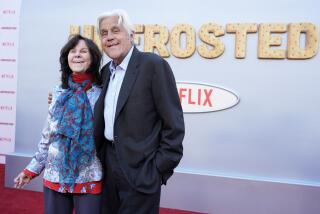Great Read: Passion and love drive Jay Leno to fill a 130-car garage
- Share via
On a sunny day in the Burbank hills, Jay Leno’s canary yellow McLaren supercar shatters the silence.
Wedged into the cockpit of the 903-horsepower hybrid P1, Leno darts around a curve and leans into the throttle. With the midday roads free of traffic, the $1.2-million McLaren surges through the canyon with a controlled fury.
“I just can’t stop driving it,” Leno says at a stop sign, before roaring off again. “It’s just a perfect blend of science and technology.... And you get the anthropomorphic sounds of the engine breathing.”
Back in Burbank where the drive started, a nondescript hangar next to the airport houses Leno’s enviable collection of 130 cars, 93 motorcycles and a menagerie of engines, spare parts and memorabilia. The world knows Leno from late-night TV and stand-up comedy, but within car circles, Leno and his collection eclipse even his contribution to the annals of television.
“The Tonight Show” was a job. Cars are an obsession.
Most blue-chip car collectors focus on a particular marque or era and curate it like artwork. Jerry Seinfeld, for instance, sticks to Porsches. Local businessman Peter Mullin prefers French art deco cars and keeps his in a museum. Leno’s friend and neighbor, Bruce Meyer — board vice chairman at L.A.’s Petersen Automotive Museum — is into American hot rods.
Leno takes a more organic approach: He just buys what he likes, across a seemingly limitless spectrum of styles, eras, cost, countries of origin and methods of propulsion. He’s keen on cars with an intriguing back story, or those marking an engineering milestone.
But mostly Leno just buys cars he wants to drive. He finds it silly to collect cars purely for show.
“I never thought of it as a collection,” said Leno, looking over the rows of neatly parked classics. “Probably in the mid-1980s, I just started to keep stuff.”
The simple strategy has since filled a warehouse with one of the world’s most valuable and eclectic collections.
There are old and new supercars, from such high-flying marques as McLaren and Lamborghini. There’s an American muscle car section, the vintage Bugatti section, the Duesenberg section. There are century-old electric cars and steam-powered cars of the same era. The British grouping houses the old-school Bentleys and Jaguars, and the odd Bristol and Lotus.
Behind nearly every model is a huge, hand-painted replica of an original advertisement for that car. Over the years, when NBC artists had downtime, Leno would pay them to recreate the ads in mural size. Look closely and you’ll notice Leno’s likeness among the drivers.
Leno was 14 when he bought his first vehicle, for $350, in 1964. It was a 30-year-old Ford truck that, at first, sat idle in his parent’s driveway in a middle-class suburb of Boston, Mass.
“Of course it didn’t run — why did you think my father let me buy it?” Leno said with a chuckle.
He learned how to get it running before he got his license. Leno then found work at a Rolls-Royce and Bentley dealership, where he first found inspiration to become an entertainer — his only chance, he figured, of ever owning a Bentley. His collection now includes a handful of vintage Bentleys from the 1920s and ‘30s.
Yet for all Leno’s talk about the intricacies and the history of his cars, he never brings up the large sums of money involved.
“Jay doesn’t buy for the investment,” said David Gooding, president and founder of Gooding & Co., a high-end auction house in Santa Monica. “His buying is completely out of passion and love.”
Leno has picked up many cars long before the collecting world discovered them and started bidding up prices.
These include the McLaren F1. In the late 1990s, these cars sold for about $1 million new. Gooding’s company sold one last year for $8.5 million. Leno picked up many of his Duesenbergs before that market exploded. Models that were hundreds of thousands of dollars in the 1980s and 1990s took off after 2000. They now regularly sell for many millions of dollars.
Leno’s 1967 Lamborghini Miura P400 — which Dean Martin bought new for his son Dino — was given to him nearly 30 years ago. At the time, the car’s engine had seized after Dino hit a berm and cracked the car’s oil pan. A friend of Leno’s acquired the car, but he gave it to Leno after figuring out it would cost more to fix the Miura than it was worth.
Leno had the engine rebuilt. Today, similar cars sell for at least $500,000.
Whatever they are worth, Leno’s cars are always ready to be driven. A key sits in every ignition. Every car has a charger cable running from the wall to the battery.
Even the 1906 Stanley Steamer Cup Racer.
“That has the distinction of being the oldest car ever stopped for speeding on the 405,” Leno said.
It wasn’t the speed that alerted the police. The car’s boiler throws off steam and the occasional flame in normal operation.
“You’re on fire — and it’s a wood car — so you attract some attention,” Leno said.
The Cup Racer is parked with other steam-powered cars in a back room of a second hangar next door. The building holds a custom machine shop and a chassis dynamometer for testing horsepower. Though Leno is plenty handy with a wrench, a famously tight schedule means the entertainer leaves the tuning and maintenance to his staff of four full-time mechanics.
They also build custom projects, such as the 1966 Oldsmobile Toronado that Leno had his mechanics convert from front- to rear-wheel drive.
“It’s hilariously fast,” he said, popping the hood of the gold coupe to show off the twin-turbocharged, 1,000-horsepower Corvette racing engine. “You pull up next to Corvettes or Porsches on the freeway, they give you a nod ... and you blow by them.”
Leno revels in the mechanical and historical nuances of each of his machines. The comedian often tries to explain a detail of one of his cars, only to have it go right over the heads of his fellow collectors, said Meyer, who has known Leno since the 1970s.
That command of the details owes to Leno’s hands-on approach to collecting.
“Because he loves to work on his cars himself, Jay has very broad and in-depth knowledge about everything he owns,” Gooding said. “I’ve never met somebody so passionate and deeply knowledgeable about a wide array of cars.”
That includes his new McLaren P1. Leno was the first customer to take delivery of the ultra-rare $1.2-million sports car. He’s put more than 1,000 miles on the odometer since getting the car in March.
On his recent jaunt through the Burbank hills, the few drivers on the road gawked at Leno’s new toy, snapping pictures at stop signs and giving eager thumbs-up.
Although the McLaren could devour any racetrack, Leno usually limits his driving to public roads. He’ll often cruise to an infamous curve on Malibu’s Mulholland Highway dubbed “The Snake” or to Newcomb’s Ranch, a bar and restaurant on the Angeles Crest Highway.
Not everything in his collection is obscure or valuable; many would be at home in any car enthusiast’s garage. There’s a 2008 Dodge Challenger SRT8, a couple of Chevy Corvairs, a 1957 Buick Roadmaster convertible.
Many of his cars, in fact, came from the garages of other car fans. The comedian’s respect in the car community means he often gets the first phone call from an elderly owner or widow looking to send a car to a good home.
“I’ve been to car shows, and there will be a great car there, and the owner says, ‘When I get rid of it, I want Jay to have it,’” Meyer said.
Unfortunately for Leno, the interest goes both ways. It’s not uncommon for Leno or his wife, Mavis, to be handed a business card by someone interested in buying one of his cars after Leno dies. “It drives my wife bananas,” Leno said. “People come up to her all the time.”
After finishing up a garage tour, Leno ambled back down the quiet corridor of the hangar and climbed into his 1955 Packard Caribbean for the commute home. Painted off-white with a bold red stripe on both sides that matches the red interior, the car is parked in front of an ad billing it as “America’s most glamorous sports car.”
The V-8 rumbles to life, and a moment later, Leno glides out into daylight. They make quite a pair. Two American icons, facing an open road ahead.
david.undercoffler@latimes.com
Twitter: @latimes_driven







